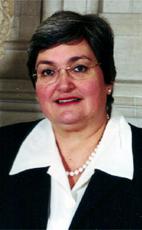Mr. Speaker, on the morning of January 29, Canadians woke to the tragic news of another horrific incident of a bus blown apart in Israel.
Dr. Yechezkel Goldberg, of Blessed Memory, was on Jerusalem bus 19. He was murdered in a senseless and appalling act of terrorism which targeted, once again, the innocent.
Dr. Goldberg, of blessed memory, a Canadian, grew up in Toronto and sang with the Toronto Boy Choir which celebrated Jewish music. He was an observant Jew, graduated from the University of Toronto and was an internationally renowned psychologist who tried to help and specialized in helping troubled teenagers.
I paid a shiva visit to his family in Thornhill and I could not find any words of comfort because of the outrage and terrible sadness that is shared by all of the Jewish community and all civilized people everywhere.
I say to his wife Shifra, their seven children, his brothers, sisters and mother, that their unbearable pain is shared. We pray for an end to violence and bloodshed and pray as well for a return to sanity in our world and peace in Israel.

